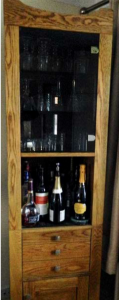The sitter has an optimistic, sociable and active approach to life, suggested by his ‘sanguine Humour’ (the Four Humours in mediaeval times were believed to determine a person’s physical and temperamental disposition) and his Jovial — Jove-like — presence at the Table. For him cancer is one of many issues in his life and he refers to it obliquely as a dance partner (see too Fragments and Curveballs). He seems to value inclusion and correspondences rather than identification with defined groups. Note, for example, how he neither identifies with nor disavows his father: sculpting like his father but in wood not stone (the image he sent from his mobile phone is of an oak drinks cabinet that he made). It is interesting for our project, ‘People Like You’, to see how the sitter shows that he belongs to categories such as men with prostate cancer, men who sit around the Table together and people who work to keep their brains active. At the same time, he makes it clear that he sets himself apart from the rest of the men round the Table and believes the feeling is reciprocated – i.e. they set him apart. Having made this observation, there was then a pause in the conversation. After a bit, he reflected, “We’re all different here”, which seemed to indicate the subject had been sufficiently explored.
“I don’t let cancer run my life,”
he says,
a sanguine presence,
Jovial,
heart stopped and rewired
half a dozen times or more.
With “three life-threatening conditions
on his dance card,” he is
“slightly less concerned about cancer.”
Born into six generations
of monumental masons
he’s familiar with death
from an early age.
As a teenager
he’s tasked with exhuming nuns
in a Sussex nunnery destined for a housing estate.
The bodies lie in the erstwhile kitchen garden.
“Great vegetables!” he grins.
His bone-shifting comrade
is a Scots lad bristling with bravado.
Next morning he wakes
to find his pal’s done a runner
and taken his mattress with him.
His father hewed the first stone
for Churchill’s grave,
but he’s not fated to be
a chip off the old block.
The world and his mother
have other plans.

He laughs.
“I’m no Michelangelo.
I don’t have a delicate enough touch
not to smash the rock.”
Though it’s delicate enough
to turn elegant pieces out of wood.
Instead
he becomes a mechanical engineer,
PR man in the music business,
seller of “interesting things,”
player in the property game,
promoter of motor sport.
“I’ve had a varied life,”
he says devilishly.
He’s also been a carer.
For fifteen years he shared
both mother’s and father’s journeys
through cancer.
“We’re afraid of death,”
he reflects,
attributes the modern condition
to living “risk-free” –
not the case in wartime.
“Insurance companies have a hard time of it.”
When he’s diagnosed himself
in his middle years
he’s wryly philosophical.
“Having a limp dick I can live with.”
For him illness is part of living.
But not everyone shares his view.
To some round the Table
he appears frivolous.
It sets him apart.
His own suffering, he feels,
is incommensurate.
There is a sense of guilt.
He smiles.
‘We’re all different here.”
There is something of Balzac or Dickens
in the sweep of the gaze,
the playful badinage.
His features are more in line
with his ancestry on his father’s side –
a Hanoverian connection
not proven but probable.
He’s read Kafka, Goethe and Nietzsche –
though does not purport to understand
the creator of the Übermensch.
He read him because
“he had to mentally.”
He also has to do crosswords –
though not The Times –
and writes a good letter of complaint.
Keeping the brain agile
is a common theme round the Table.
Brunel and Stephenson are his heroes,
steam trains a passion.
“I’ve done the whole nine yards
of standing at the edge of Kings Cross Station,”
he fesses with broad-gauge grin.
He cooks for himself – a sound diet
with fresh fruit and veg.
And yet.
“I don’t know what I’m doing wrong!”
he wails bleakly, surveying the girth
magnified by the acute angle
of the gaze.
It troubles him constantly.
Cancer
on the other hand
is “an occasional inconvenience.”